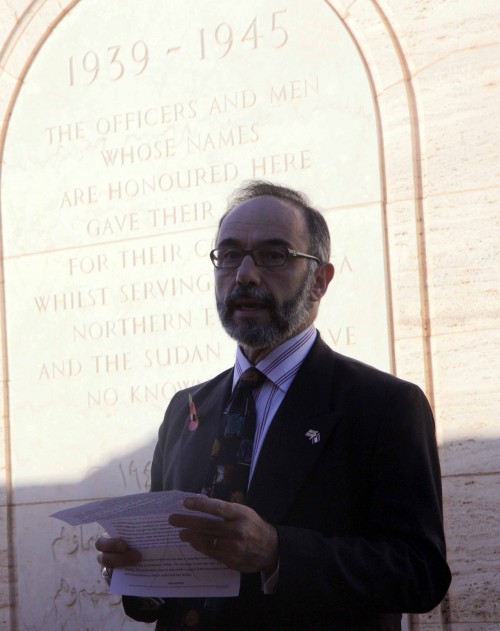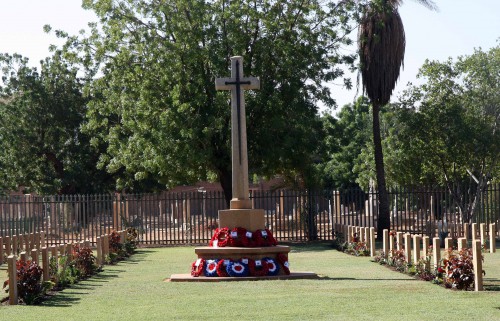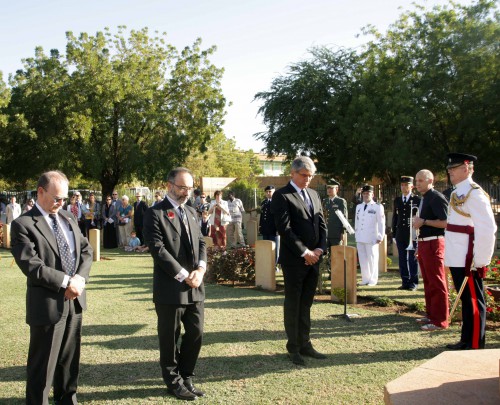12th November 2013
Remembering the Fallen: Working to end Conflict
Every year since the First World War came to an end in 1918 at the 11th hour on the 11th day of the 11th month, it has been a tradition on the Sunday closest to it to commemorate and remember all those lost as a result of conflict and its aftermath. Sudan sadly is no stranger to conflict, and its terrible human costs.
So on Sunday 10 November we held a commemorative service at the Commonwealth War Graves Cemetery in Khartoum.
The site was generously donated by the Government of Sudan to bring together the fallen from a number of different burial sites. It is the final resting place of nearly one thousand war dead from many countries. They fell in Sudan, Ethiopia and Eritrea during the First and Second World Wars and other campaigns.
They include civilians as well as military; Christians, Muslims, Hindus, those of other faiths and of none.
The ceremony was simple and incongruous. The cemetery look beautiful. It is an immaculately maintained garden in the centre of Khartoum, looked after by committed Sudanese staff. Under a glorious morning sun, the last post sounded, a Sudanese military band played and we placed wreaths to symbolise our act of remembrance. Wandering around the grave stones afterwards was sobering: most of those who died were young men barely out of their teens.
The ceremony is not only for those who have fallen in the two World Wars. It is a day we remember all those who have died whilst seeking to end conflict and bring peace. This includes humanitarian and aid workers, diplomats, soldiers, police officers and peacekeepers, of all nationalities and creeds.
In Sudan we remembered in particular the 756 Sudanese army and police casualties from the Second World War. The Sudan Defence Force took part in campaigns in Ethiopia, Eritrea, Egypt and Libya in the service of their country, as part of the allied war effort. Although their names are omitted from the memorial at the request of the Sudanese Government, they are not forgotten and it is hoped that they will, one day, be commemorated on a national war memorial.
This was also the occasion to commemorate those who have died in the service of peace in Darfur, where UNAMID has suffered 173 fatalities since its inception and in Abyei, where UNISFA, has suffered 12.
It is good and right and proper to remember those who have fallen. But conflict continues. Remembering them is also a spur to recommitting ourselves to help to end conflict and violent death in Sudan, as in many places around the world. The British Embassy, and the international community, has a role to play in that. Much of our work is focussed on trying to facilitate and support a Sudanese-led process to create a diverse and tolerant political environment in which political differences can be resolved by non-violent means.
The ceremony on 10 November was a reminder of why it is so important to continue this work.



This is great celebration for those whom died for this silly war .
Unfortunately our soldiers died and were taken to war without their consent .we must be very sad for our poor people whom scarified in this war for nothing but the glory and victory for the rich countries .
We must learn from this war but realy I disagree with the respectable Ambassador Ayoub.If our soldered are Moslems we must burry them in a Muslim way.
With my deep respect to Peter Tiber.
It is good to commemorate and remember all those lost as a result of conflict and its aftermath. But it’s so depressing and sad that Sudan is still losing civilians as well as military on daily bases as result of different local conflicts, truly it’s horrible human costs. We highly appreciate the international effort particularly the British effort for working toward the peace of Sudan and we encourage them to grant more effort to help Sudan to stop the meaningless and unjustifiable war. Looking ahead for peaceful Sudan. Many thanks to the British Embassy for sharing this event.
War is never justifiable, and neither is silence. For peace to prevail, political will must be present. Fear of trying new ideas, which almost always translates into chaos, put restraints on us all. Things are changing for the better; the old empire’s tone is finally inlined with the colonys’ aspirations. That’s why I’m forced to say, but with a great sense of pride I’m skeptically hopeful.
dear Peter
it has deep meanings to remember all those lost as a result of conflict and its aftermath ,
sure Sudan sadly is no stranger to conflict, and its terrible human costs.
let us do our best to spread peace around the world , to stop the meaningless war in our country Sudan
thanks
Its very important to work together all of us UN, UK and Sudan pepole to save our beloved home.
Peace is not just camping promise or childhood dreams no its power acts against heat and war.
After all we are all humen in this planet and we share every things.
1- it is gratifying to note that the British Embassy and others commemorate the Occasion annually. I failed to understand why the Sudanese who fell on the different fronts were separated from their colleagues when they all died for the same cause in the same arena?!
2- I previously wrote drawing the attention of those who are looking after list of those who receive the letters of the Ambassador! Still my wonder remains unanswered!
3- Many thanks.